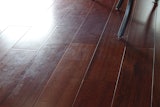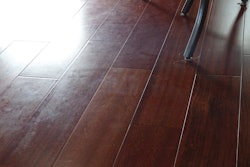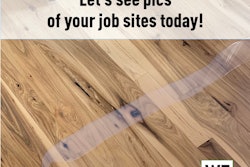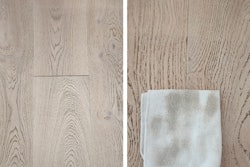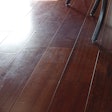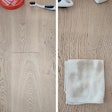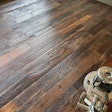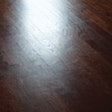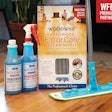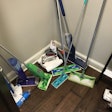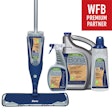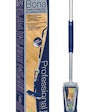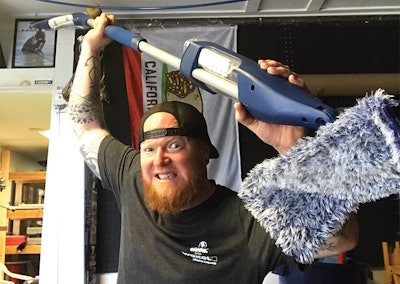
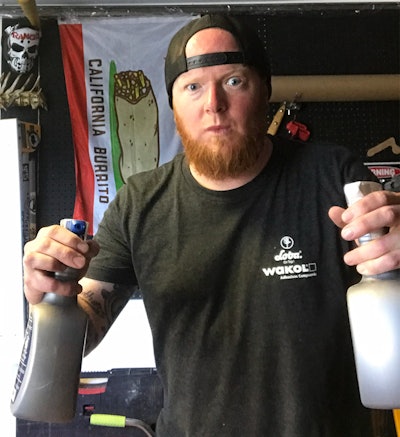 Do you feel like you have to take desperate measures to get customers to understand wood floor maintenance?
Do you feel like you have to take desperate measures to get customers to understand wood floor maintenance?
As wood flooring pros, we are obsessed with all the details of installation, sanding and finishing. You may think that when the last coat of finish is down and looking great, or that last prefinished board is nailed, your job is done. But really, the last thing we need to do on every single job is something I see and hear a lot of floor technicians leaving out, and that's informing our clients about the proper care and maintenance of their hardwood floors.
Many pros might say it's on the homeowner to go and pick up a cleaning kit, or maybe you just leave a cleaning kit behind along with your final invoice. (If you're leaving a maintenance kit behind, you're taking a step in the right direction, at least.)
Why education matters
Why is it so important that you educate the client or end user on how to properly care for and maintain their floors?
For starters, it's your job as a professional. You can be held liable in court for not properly educating your clients on how to properly maintain their floors with the right products. Say you finished up a 2,000-square-foot prefinished plank job, and you neglected to inform them about correct maintenance procedures and leave behind a care kit and instructions. Then that customer goes out and gets a maintenance kit that is not the right one for that specific floor and/or finish. This could result in severely damaging the newly installed floors, possibly stripping or damaging the finish, and voiding the manufacturer's finish warranty. That could all lead to litigation followed by either a full sand or full tear-out and replacement, and all of those costs could fall on the contractor.
There are also potential issues when the homeowners have not been properly informed about the care of their newly sanded and refinished floors. Many times, they'll grab an oil soap or some other big box store cleaner to take care of their floors, and the cleaners build up over time and screw up their floors. Or they use a "polish" or product that is supposed to "refresh" the floor, and their floor ends up looking worse. Again, if you haven't told the customer not to do these things and put those directions in writing, it can all come back to you to fix for free.
RELATED: Clear Up Confusion About Wood Floor Maintenance
Say you just installed a prefinished floor that was finished with a natural oil finish and the manufacturer recommends the floors be maintained with a cleaner specifically for natural oiled floors. If your client goes and uses a cleaner meant for polyurethane-finished wood floors, it will strip the oils from that floor, causing the floor to look dry and become vulnerable to spills and dirt. Now turn the situation around: Your client ends up using a natural oil cleaner on a urethane-finished floor, and over time you get a cloudy buildup from the oils and materials in the natural cleaner. Or worse, the floors may become a slipping hazard because the products that are meant to clean and nourish natural oiled floors are now sitting on top of that film finish with nowhere to go.
Basic instruction essentials
A lot of what is in these care and maintenance instructions is very simple and straightforward.
Daily: Sweep or dust mop.
Weekly: Vacuum using the bare floor setting.
Monthly: Clean with recommended cleaners, making sure to work in sections and rinsing the mop head as you go.
Every few years: Get a maintenance coat (possibly sooner depending on the finish system and the floor traffic).
Every few decades: Sand and refinish (again, the length of time depends on the floor, the finish and the floor traffic).
Discussing a longer term maintenance schedule can lead to realistic expectations from the customer about their finish and also help you make more money in the long-term. Some things you can discuss in the longer term:
• Annual "deep cleans" using a power scrubber system.
• Scheduling recoats (either by abrading the floor or using a chemical recoating system), possibly on a yearly schedule.
•Depending on the finish used (particularly for oil finishes), quarterly to semi-annual treatments.
•Holiday deep cleans (either before or after the holiday season).
RELATED: What Confuses Wood Flooring Consumers and What to Tell Them
Help yourself by doing these easy things
Yes, this is all common sense, and the easiest way to make sure you are covered on every job is to do a few relatively easy things:
• Put a line item in your estimates and contracts that covers the specific care and cleaning instructions for that particular floor and finish. All you need to do is go to the finish manufacturer's website, look up the finish product, and copy and paste the care and maintenance instructions along with the warranty into your contract. I suggest it be followed by something like this: "By signing this contract, the customer has read and acknowledges the terms of the Work Order Contract and the Care & Maintenance Instructions."
• Add your cost of the maintenance kit into the estimate.
• At the end of the job, give them the maintenance kit and go over the instructions, being sure to place an emphasis on the importance of using ONLY the cleaner provided for that particular floor and finish system. Make sure they know where they can purchase more of the correct cleaner once they run out of the initial supply.
As long as they've been properly informed and have the right tools, you've done your job. Then it's up to them to take it from there.










